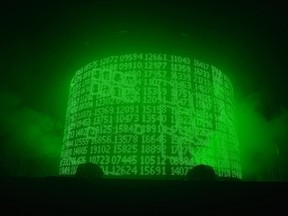This article was originally published in The Gazette.
Even when a festival isn't centred on environmental awareness, its visibility is useful in promoting such causes, notably with large-scale artworks.

Digital art is a linchpin of Montreal's Mutek festival. Pictured: A display from electronic musician and DJ Richie Hawtin's Plastikman Live, presented at the festival in 2011. Photo by MUTEK /Montreal Gazette files
Considering the space they occupy in cities, festivals often overlook their potential to raise environmental awareness and promote eco-friendly actions that can lead to lasting change. These events can serve as public forums to spark community discussions on important causes.
There are examples of festivals using art to highlight such issues. Montreal’s Mural Festival has showcased artworks that address environmental concerns. Since murals are painted on building facades, they have high visibility and can easily catch the attention of people as they go about their day. The Art Souterrain festival, which presents artworks in Montreal’s underground network, also addressed issues of the environment and climate change this year.
Like many other festivals that aren’t eco-themed, Montreal’s Mutek — an electronic music and digital arts festival that marks its 25th anniversary from Tuesday, Aug. 20 through Sunday, Aug. 25 — is committed to addressing the climate crisis by taking steps to reduce its environmental impact. In 2023, it reached Level 3 certification of the Bureau de normalisation du Québec’s standard for managing events responsibly, which confirms an event is eco-friendly and socially responsible. This year, Mutek will also discuss how generative artificial intelligence can contribute to a more ecological and ethical future in digital arts.
Mutek includes a conference component, Mutek Forum, which this year has the theme Utopia or Oblivion: Crafting Human-Centred Technological Futures. The forum promises discussions on the future for digital arts and generative AI, taking into account environmentally minded horizons and bringing together artists, scholars, designers and others. The forum will feature more than 60 events, including workshops, presentations, panels and networking opportunities.
Tuesday’s lineup is particularly exciting, featuring the theme Into the Wild: Towards AI Ecologies and exploring how AI and art can help shape the future. The discussions will feature experts from renowned companies and institutions like the Massachusetts Institute of Technology, Google DeepMind and Ubisoft as well as the holder of the UNESCO Chair in Urban Landscape. These guests sound promising, and are likely to bring valuable insights from diverse perspectives.
Yet these opportunities are ticketed, making them less accessible to a general audience. When a well-known festival offers talks about important topics, it would be beneficial if these events were free and open to everyone. Digitizing the events could help reach an even broader audience.
Mutek may not be centred on environmental awareness, but its visibility is useful in promoting such causes. The festival’s free Village Numérique circuit in the Quartier des spectacles features more than 20 digital art installations, a number of which have environmental themes.
Many digital artists create works that highlight the climate crisis. Their art often shows future scenarios, giving us a glimpse of the consequences of our actions. Take, for instance, Montreal-based digital art studio Iregular’s work Products, which highlighted human contributions to global waste and criticized consumer culture. This piece, which was displayed in the Quartier des spectacles in 2021, featured a large interactive digital screen in a public space. It asked audience members to open their mouths to activate a fountain of trash, symbolizing how all that waste ends up in the common water system, threatening to overwhelm us.
Researchers have studied how art can raise environmental awareness, especially in urban settings. Art can turn public spaces into educational platforms that inform people about environmental issues while strengthening connections between the human and non-human. One reason for this is that art can draw people in and connect them for a mutual cause. By working with digital artists focused on environmental themes, festivals such as Mutek have the capacity to feature a variety of accessible artworks, such as games and installations, to raise environmental awareness, spark memorable interactions and inspire conversations among the general public.
Burcu Olgen is a PhD candidate and public scholar at Concordia University studying AI-augmented, game-based interactions on ecological themes in the public realm.

